#Sansa's marriage to Tyrion causing a conflict to her succession status
Explore tagged Tumblr posts
Text
“So you pray. Have you considered your sisters? What of their rights? I agree that the North must not be permitted to pass to the Imp, but what of Arya? By law, she comes after Sansa…your own sister, trueborn…” “…and dead. No one has seen or heard of Arya since they cut Father’s head off. Why do you lie to yourself? Arya’s gone, the same as Bran and Rickon, and they’ll kill Sansa too once the dwarf gets a child from her. Jon is the only brother that remains to me. Should I die without issue, I want him to succeed me as King in the North. I had hoped you would support my choice.” (Catelyn V, ASOS)
This is truly one of, if not the, most erased passages in the books. People either completely ignore its existence or act as though George wrote it in some secret, coded language that makes it all ambiguous.
#asoiaf#robb stark#catelyn stark#arya stark#jon snow#fandom nonsense#people really stick their heads in the sand for this one#Sansa's marriage to Tyrion causing a conflict to her succession status#Arya being discussed as heir over Sansa and not being chosen ONLY because she is presumed dead#Jon being unambiguously chosen as Robb's heir which somehow gets ignored a lot???#/George left everything so vague around Robb's will/ and Cat and Robb literally spell everything out in the conversation they have#I mean I shouldn't be surprised by anything at this point but 🙄#Anyways just cause fandom ignores it doesn't mean George will#Arya can be heir over Sansa and Jon IS named heir and legitimatized
140 notes
·
View notes
Photo
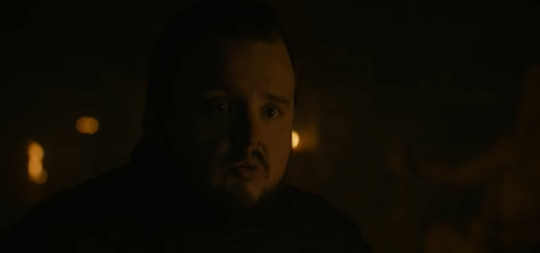
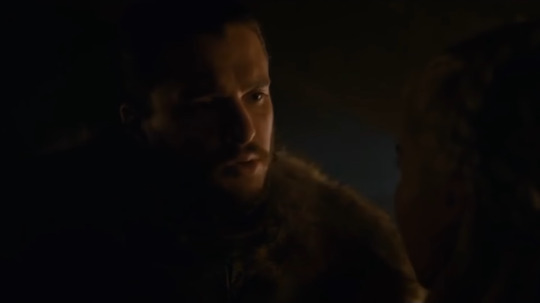

Truth
This word has been mentioned in all the episodes so far. But what’s interesting is that all three times this word was uttered was in the Crypts.
If we look at it in a surface level, it’s not much. The word is said in different episodes by different people in different contexts. The three scenes have a literal meaning, but there’s more than one meaning to every, any, text.
Taking Roland Barthes’ theory of the Five Codes from “S/Z”, we could say that these scenes can fall into one group because they all hint at the same thing, their connotation is the same: they all hint at the truth. These scenes share the same signifier (truth), which means that “truth” is something that will appear more than once, it will appears several times, so it’s safe to say that “truth” is a crucial aspect of the story. This refers to the second code: the semantic code. But we can view “truth” through another lens. We can take this word and ask ourselves what it means, what does it hint at, what does it answer. The word acts as an enigma: it’s both a question and an answer, one that will come up again and again, until we have more pieces of the puzzle, so we could finally piece it all together. This refers to the first code: the hermeneutic code.
So, having this in mind, there are some questions that arises when watching these scenes while being aware of their shared connotation and the repetition of the word truth: What could this mean? How does this one word drive the story forward?
8x01: “Winterfell”
The scene where this is said is during the revelation of Jon’s parentage to him by Sam.
J: I wasn’t a king.
S: But you were. You’ve always been.
J: I gave up my crown, Sam. I bent the knee, I’m not King in the North anymore.

S: I’m not talking about King in the North, I’m talking about the King of the bloody Seven Kingdoms.
[…]

S: Your mother was Lyanna Stark. And your father, your real father, was Rhaegar Targaryen. You’ve never been a bastard. You’re Aegon Targaryen, true heir to the Iron Throne.

What’s interesting is that during the reveal, the camera zooms in on Jon’s face. This same technique is used when Jon reveals the truth to Dænerys in the following episode. We watch Jon take in all the information Sam is giving him.

J: My father was the most honorable man I’ve ever met. You’re saying he lied to me all my life?
S: Your father, well, Ned Stark, he promised your mother he’d always protect you.
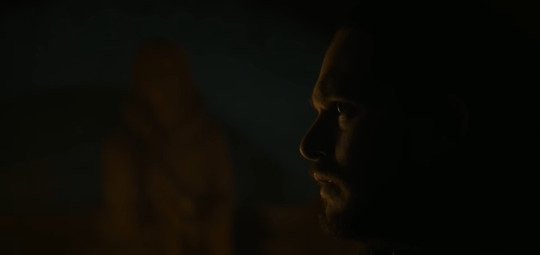
S: And he did. Robert would’ve murdered you if he knew. You’re the true King. Aegon Targaryen, the sixth of his name, Protector of the Realm, all of it.
This shot is poignant. It’s not only there to put Jon in the same frame with his mother. It’s also there to remind us what Ned did for love. He lied to his wife, to his family, to his King. All because of her sister. “The things we do for love…”


J: Dænerys is our Queen.
S: She shouldn’t be.

J: That’s treason.
S: It’s the truth. You gave up your crown to save your people, would she do the same?
While the first thing that comes to mind when we link this scene with the word “truth” is the truth of Jon’s parentage: that’s the literal meaning. But we must not forget the when and why that word it’s said.
Sam says that Dænerys shouldn’t be queen, to which Jon replies: “it’s treason”, and Sam is quick to say that what he’s saying is the truth: she shouldn’t be queen, and Jon doesn’t deny what Sam says. Remember that this conversation started with Sam telling Jon that Dænerys executed his father and brother for not bending the knee.
If we look at it with the hermeneutic code in mind, the scene acts as a formulation of the enigma: should Dænerys be Queen? It’s the first episode of the season, a lot of things can still happen. Some believe that she should be Queen, others don’t. But what this scene does to us, the audience, is make us ask ourselves this. That “truth” will come up again, whether in actions or lines. The enigma presented in 8x01 was present in both 8x02 and 8x03, and it’s only right that it will be present in the remaining episodes, because it’s a question it needs answering.
It gets a little more difficult with the semantic code, because the meaning can change throughout the story. In this particular scene, the word “truth” is connected to monarch: Jon is the true heir, Dænerys claims to be the true heir. One is the one that’s supposed to be the monarch, the other wants to be the monarch. So, in 8x01, we can equal the word “truth” to the concept of “monarch”.
So this scene not only deals with the truth of Jon’s parents, but also with the connotation of monarch and the formulation of the enigma.
8x02: “A Knight of the Seven Kingdoms”
This scene is fairly similar to the one in 8x01, overall. There’s a reveal of the truth of Jon’s parentage in the Crypts. But the context and the connotations of this scene are vastly different. We have a shaken Jon with a clueless Dænerys, but when the reveal happens, the tension instantly grows, because of what this means politically.

D: Who’s that?
J: Lyanna Stark.
It’s pretty significant that this reveal happens in front of Lyanna’s statue. In 8x01, when Sam formulated the enigma, it was in front of Lyanna’s statue as well. From a visual POV, the show doesn’t want us to forget the importance of Lyanna, whether it’s the promise she got from Ned or the fact that she’s Jon’s mother. But right now, we’re taken right to history between House Stark and House Targaryen, and how Lyanna and Rhaegar’s elopment caused caos and war.
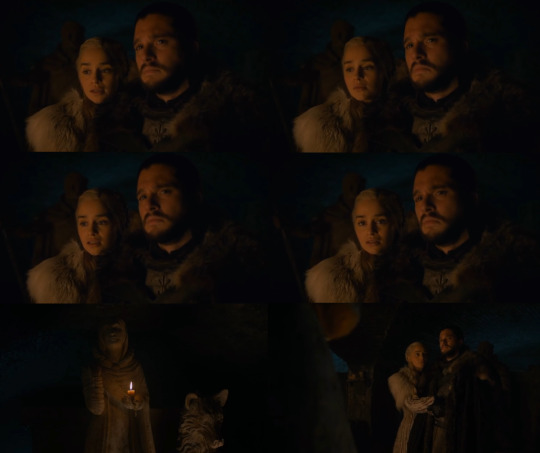
D: My brother Rhaegar… Everyone told me he was decent and kind. He liked to sing, gave money to poor children… And he raped her.
J: He didn’t.

J: He loved her. They were married in secret. After Rhaegar fell in the Trident, she had a son.
This is the first time during the scene they are not only physically separated, but facing each other, with Lyanna’s statue in the back of the shot, appearing to be between the two. While in the 8x01 scene the statue represented Ned’s promise to Lyanna, now it represents an obstacle in Jon and Dæny’s relationship.

J: Robert would’ve murdered the baby and Lyanna knew it. So the last thing she did, as she bled to death in her birthing bed…

J: was give the boy to her brother, Ned Stark, to raise as his bastard. My name, my real name, is Aegon Targaryen.
During this reveal, we’re meant to see Dæny’s reaction to the truth. The camera slowly zooms in on her face just as Jon is telling her about Lyanna’s final moments and Ned’s promise.
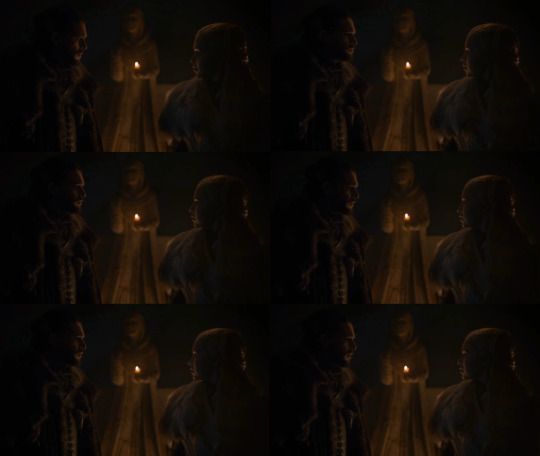
D: That’s impossible.
J: I wish it were.
D: Who told you this?
J: Bran. He saw it.
D: He saw it?
J: And Samwell confirmed it. He read about their marriage in the Citadel without even knowing what it meant.
Dænerys is quick to ask about how Jon found out about this, clearly questioning its veracity, as she will do in the next .

D: A secret no one in the world knew, except your brother and your best friend. Doesn’t it seem strange to you?

J: It’s true, Dæny. I know it is.
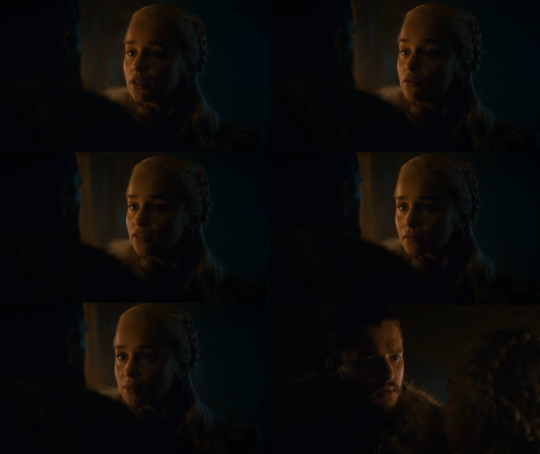
D: If it were true, it would make you the last male heir of House Targaryen. You’d have a claim to the Iron Throne.
Again. like the scene in 8x01, the word “true” is linked to Jon’s real parentage. The literal meaning is the same.
But Jon says “It’s true, Dæny. I know it is” after she questions the veracity of what Jon, Bran, Sam and the audience know is true. Jon isn’t lying. But Dæny still refuses to accept it as the truth, for she says “if it were true”. For her it’s something that can be refuted.
If we look at it with the hermeneutic code in mind, what this scene does is gives us a partial answer to the enigma from 8x01: the rules of succession in Westeros indicate that the heir to the Throne is the eldest son. In this case, the Mad King having been overthrown and Rhaegar, his heir, killed in battle, the next one in the line of succession would be Jon, for he is the last living legitimate son of the heir to the Throne. His claim surpasses Dæny’s, who’s a third child and female. So, should Dænerys be Queen of the Seven Kingdoms? Well, if we take into account the rules of succession, the answer would be no. This scene gives us an answer to that question, but it’s not the definitive answer.
If we look at it with the semantic code in mind, the word “true” is still connected to the word “monarch”, but it could also be connected to “conflict”. This connotation is implied. Dænerys has been fighting for the Iron Throne since s1, but now it turns out she’s not even the righful heir. The implied conflict comes from the last two remaining Targaryens, one that has a legitimate claim to the Throne as the true heir, and the other who has been fighting to get it back for most of her life.
So this scene not only deals with Jon’s true parentage (again), but it gives a partial answer to the enigma and hints at a possible conflict.
8x03: “The Long Night”
This scene is different than the first two, in that it’s not about the parentage reveal. This scene, in essence, is about sacrifice, making a difference, hopelessness and bravery.
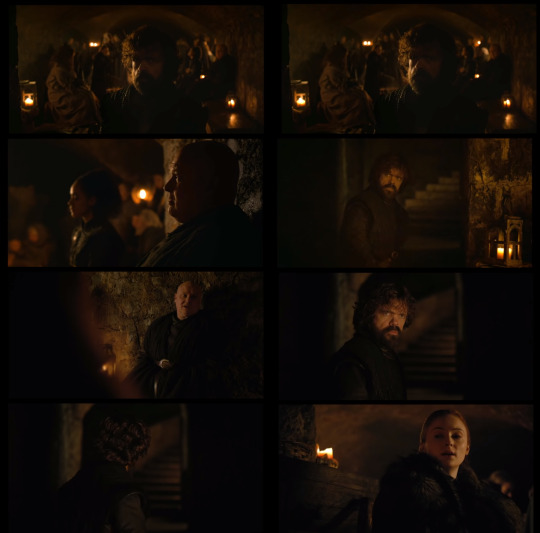
T: If we were up there, we might see something everyone else is missing. Something that makes a difference.
V: *scoffs*
T: What? Remember the Battle of Blackwater? I brought us through the mudgate.
V: And got your face cut in half.
T: And it made a difference. If I was out there right now
S: You’d die.
The framing of the first two shots is interesting; Tyrion is in the middle of the frame, looking straight at us, it’s as if he’s saying his line to us: “if we were up there, we might see something everyone else is missing. Something that makes a difference”. With the reaction shot of Varys, the spell is gone, we’re no longer interacting with Tyrion, we’re mere spectators. They do a back-and-forth until Sansa cuts in.

S: There’s nothing you can do.
Now, the back-and-forth is between Tyrion and Sansa.

T: You might be surprised of the lenghts I’d go to to avoid joining the Army of the Dead. I could think of no organization less suited to my talents.
S: Witty remarks won’t make a difference. It’s why we’re down here, none of us can do anything.
One of the things that makes this scene interesting is how differently are Tyrion and Sansa handling hopelessness in the face of danger. Tyrion just can’t seem to sit still, while Sansa admits that the situation is far out of her reach. All they can do is wait.
When she says that none of them can do anything, she isn’t saying that they’re useless because they can’t fight. She’s saying that they’re better down in the crypts because them being out there where the fight is wouldn’t make a difference.
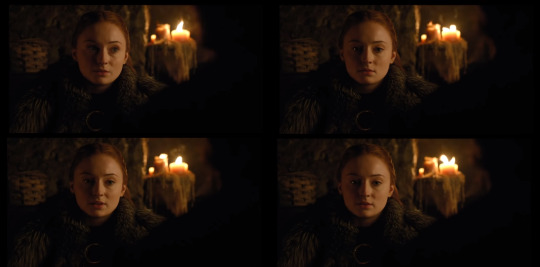
S: It’s the truth. It’s the most heroic thing we can do now, look the truth in the face.
Sansa saying “it’s the truth” is pretty meaningful. It’s admitting there are certain battles she just can’t fight, where she has to sit and wait and hope for the best. It means having to trust the ones fighting the good fight for you.
Look at her face in the second, third and fourth shots. She’s not looking at Tyrion while saying “it’s the most heroic thing we can do now, look the truth in the face”, she looks fazed out.
So, what is this truth Sansa is referring to? Well, literally, is about that none of them can do anything about their current situation. That’s the literal meaning of the word “truth” in this scene.
Having the semantic code in mind, the word “truth” takes on another connotation, different from “monarch” and “conflict”. In this scene, it relates to “change”: the heart of the scene is the fact of wanting to change things for the better, of having and giving advantage to their allies in order to come out on top, and whether or not they can do this. It’s implied these characters want to be a driving force of change, and they could be: it’s just that given this particular situation, they just can’t.
But with the hermeneutic code in mind, it’s different. While you can connect the connotations of the word “truth” to the enigma presented by Sam in 8x01, should Dænerys be Queen?, I believe we’re given a suspended answer. Why? Because we know for a fact that both Sansa and Tyrion are driving forces of change: the former made it possible for her family to retake Winterfell, the latter believes himself to be a driving force of change by bringing Dænerys to Westeros to reclaim the Iron Throne. They’re also on opposite sides; Sansa fights for Northern Independence, Tyrion is Dæny’s Hand. So there you’ve got conflict. We started to get our answers regarding the 8x01 enigma with the Jon-Dæny scene in 8x02, but came to a halt in 8x03. But it’s not that 8x03 gave us nothing, it reminded us of the players on both sides of the conflict, and the change they’re both fighting for.
But it could also introduce another enigma: what can we do to make a difference? This question is in no way isolated from the other. They’re both political in nature, they both have political implications. If we go this route, we have to take into consideration the characters with lines on this scene: Varys, Tyrion, Sansa and Missandei. Given that they all survived the Battle of Winterfell, is only logical to think that they will have a role to play in the political aspect of the conflict in the second half of the season. So, what can these characters do to make a difference? That’s a question we’ve got no answer for (right now). Maybe 8x04 will gives us a promise of an answer or a partial answer. But one thing is clear: now that the Long Night is over, it’s time to play the Game of Thrones again.
#got#game of thrones#got s8#game of thrones s8#8x01#8x02#8x03#winterfell#a knight of the seven kingdoms#the long night#samwell tarly#jon snow#daenerys targaryen#tyrion lannister#sansa stark#r+l=j#dance of dragons 2.0#the game of thrones#got meta#got s8 speculation#scene analysis#my meta#my thoughts#my stuff#roland barthes#s/z#long post#sorry if it's kinda difficult to understand#hit up my ask box#if there's something that wasn't clear
212 notes
·
View notes